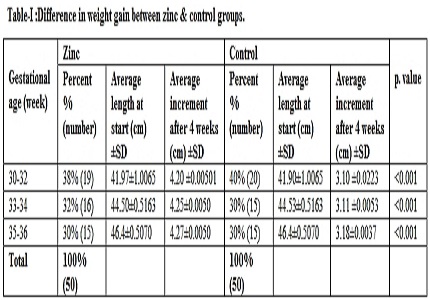The effect of Zinc on the growth of preterm baby in Baghdad, Iraq
Abstract
Background: Zinc is an essential trace nutrient, has important function to play in growth. Many studies have indicated that a negative Zinc balance exist in preterm and small for gestational age infants until approximately 37 weeks of gestation. Several workers have recorded an improved Zinc status, good weightgain and better linear growth velocities in preterm infants supplement with Zinc.
Aim of study: The current study evaluates the effect of zinc supplementation on growth parameters of premature infants. Also to determine the role of zinc therapy in treatment of acute diarrhea in children aged 3 months - 2 years.
Methods: This randomized clinical trial study was done in Imamein Kadhemain Medical City, pediatric department, in the period from 1st December 2013 to 30th july2014. One hundred hospital born preterm infant with gestational age <37 weeks, whose were admitted to the hospital , when they were ready for discharge ,they randomly assigned to receive Zinc & multivitamins (50 neonates) ormultivitamins only (50 neonates). Multivitamin are vitamin A, vitamin D, iron & folic acid. The Zinc group received it in a dose of2 mg/kg/day. Weight, length and head circumference were followed up after 4 weeks.
Results: In this study no significant difference in weight, length and head circumference between the zinc group & control group at the start but a significant difference were found at 4 weeksfollow up (P<0.05).
Conclusion: Zinc supplementation for preterm babies was found effective to enhance the growth in early weeks of life, while in regard to difference in growth according to types of feeding there is no significant difference.
Downloads
References
2. Dilip K Mukherjee, MKC Nair, Growth And Development, 2008, Jaypee Brothers Medical Publishers chapter.22.232.
3.Classen HG, Gröber U, Löw D, Schmidt J, Stracke H. [Zinc deficiency. Symptoms, causes, diagnosis and therapy]. Med Monatsschr Pharm. 2011 Mar;34(3):87-95. [PubMed]
4. McCarthy TJ, Zeelie JJ, Krause DJ ,The antimicrobial action of zinc ion/ antioxidant combinations. Clinical Pharmacology & Therapeutics, 1992 :17: 5. [PubMed]
5. Solomons NW. Mild human zinc deficiency produces an imbalance between cell-mediated and humoral immunity. Nutr Rev. 1998 Jan;56(1 Pt 1):27-8. [PubMed]
6. Heyneman CA. Zinc deficiency and taste disorders. Ann Pharmacother. 1996 Feb;30(2):186-7. [PubMed]
7. Maret W, Sandstead HH. Zinc requirements and the risks and benefits of zinc supplementation. J Trace Elem Med Biol. 2006;20(1):3-18. Epub 2006 Feb 21. [PubMed]
8. Milbury PE and Richer AC. Understanding the Antioxidant Controversy: Scrutinizing the “fountain of Youth”. Greenwood Publishing, 2008, Group 99.
9.Valberg LS, Flanagan PR, Kertesz A, Bondy DC. Zinc absorption in inflammatory bowel disease. Dig Dis Sci. 1986 Jul;31(7):724-31. [PubMed]
10.Sandstead HH. Causes of iron and zinc deficiencies and their effects on brain. J Nutr. 2000 Feb;130(2S Suppl):347S-349S.
11. Hambidge KM and Krebs NF. Zinc in the fetus and neonate. In: Polin R, Fox W, Abman SH, editors. Fetal and Neonatal Physiology. 3rd edn. Philadephia: Elsevier Science; 2004. p. 324-346.
12. Gupta AP, Bhandari B, Gupta A. Serum copper, zinc, magnesium and calcium in neonates. Indian Pediatr. 1984 Jun;21(6):569-73. [PubMed]
13.A llen LH Jr. Zinc: the next global agenda? Malays J Nutr. 2000 Sep;6(2):189-95. Epub 2000 Sep 15. [PubMed]
14. Friel JK, Andrews WL, Matthew JD, Long DR, Cornel AM, Cox M, McKim E, Zerbe GO. Zinc supplementation in very-low-birth-weight infants. J Pediatr Gastroenterol Nutr. 1993 Jul;17(1):97-104. [PubMed]
15. Black M. Zinc deficiency and childhood development. Am J Clin Nutr, 1998; 68: 4-9. [PubMed]
16. Taneja S, Bhandari N, Rongsen-Chandola T, Mahalanabis D, Fontaine O, Bhan MK. Effect of zinc supplementation on morbidity and growth in hospital-born, low-birth-weight infants. Am J Clin Nutr. 2009 Aug;90(2):385-91. doi: 10.3945/ajcn.2009.27707. Epub 2009 Jun 24. [PubMed]
17. Sur D, Gupta DN, Mondal SK, Ghosh S, Manna B, Rajendran K, Bhattacharya SK. Impact of zinc supplementation on diarrheal morbidity and growth pattern of low birth weight infants in kolkata, India: a randomized, double-blind, placebo-controlled, community-based study. Pediatrics. 2003 Dec;112(6 Pt 1):1327-32.
18. Hoque A, Ali SMK. Role of zinc in low birth weight neonates. Bangladesh Med J, 2009; 38: 24-30. [PubMed]
19.Castillo-Durán C, Rodríguez A, Venegas G, Alvarez P, Icaza G. Zinc supplementation and growth of infants born small for gestational age. J Pediatr. 1995 Aug;127(2):206-11. [PubMed]
20. Lira PI, Ashworth A, Morris SS. Effect of zinc supplementation on the morbidity, immune function, and growth of low-birth-weight, full-term infants in northeast Brazil. Am J Clin Nutr. 1998 Aug;68(2 Suppl):418S-424S. [PubMed]
21. Islam MN, Chowdhury MA, Siddika M, Qurishi SB, Bhuiyan MK, Hoque MM, Akhter S. Effect of oral zinc supplementation on the growth of preterm infants. Indian Pediatr. 2010 Oct;47(10):845-9. Epub 2010 Jan 15. [PubMed]
22. Ramakrishnan U, Nguyen P, Martorell R. Effects of micronutrients on growth of children under 5 y of age: meta-analyses of single and multiple nutrient interventions. Am J Clin Nutr. 2009 Jan;89(1):191-203. doi: 10.3945/ajcn.2008.26862. Epub 2008 Dec 3. [PubMed]
23.Díaz-Gómez NM, Doménech E, Barroso F, Castells S, Cortabarria C, Jiménez A. The effect of zinc supplementation on linear growth, body composition, and growth factors in preterm infants. Pediatrics. 2003 May;111(5 Pt 1):1002-9. [PubMed]
24. Bueno O, Bueno G, Moreno LA, Nuviala RJ, Pérez-González JM, Bueno YM. Zinc supplementation in infants with asymmetric intra uterine growth retardation; effect on growth, nutritional status and leptin secretion. Nutr Hosp, 2008; 23:212-219.

Copyright (c) 2016 Author (s). Published by Siddharth Health Research and Social Welfare Society

This work is licensed under a Creative Commons Attribution 4.0 International License.


 OAI - Open Archives Initiative
OAI - Open Archives Initiative


